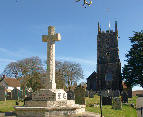Winkleigh’s second V.A.D. Nurse was Evelyn Alice Johnson, who was born in early 1891 in Kingswear, Brixham, Devon, the daughter of Ada and Ronald Frederick Johnson. Her father, Ronald Frederick Godolphin Johnson was born in 1862 at Cross in Little Torrington, a house now classified as an historic building. He had followed in his fatherís footsteps and become a solicitor, his father being Master of the Rolls. After graduating from Oxford, Ronald moved to London where he marrried Ada Elizabeth Stone early in 1887 in Marylebone. The couple soon moved to Windsor where their first child Olive was born early in 1890. A year later, Evelyn Alice was born in Kingswear, Devon. Within weeks, the family had moved again to Hawkesley House near Leominster, where sadly Olive was to die soon after the April census in 1891. Grace was born a year later, in Kawsesley House, Monkland, Hertfordshire. Ronald Frederick was now a Magistrate, and is described as living on his own means.
By 1893, the family had moved again. Ronald Henry Keith was born at Winkleigh Court late that year, followed by Lawrence Frederick, also born there in the summer of 1896. In 1901 Winkleigh Court had been rented out and the family were boarding in two separate houses in Dalton in 1901, father and mother with Evelyn, and sister Grace with Ronald and Lawrence, prior to their move into the Old Parsonage at Winkleigh. This move may have been to facilitate their father’s move to live in Ashreigny, leaving the rest of the family at the Parsonage. He died in March 1908 at the age of only 44, and is buried in Ashreigney. Evelyn has not yet been identified in the 1911 census, but in that year her two brothers were at different boarding schools being prepared for their expected roles in life. Lawrence attended the ‘Tamworth Agricultural and Colonial College’ in Tamworth, while Roland was educated at Cheltenham College. Their sister Grace was at a private mental health nursing home in Charlton, near London. Their mother remained at the Parsonage with an elderly servant, Annie Passmore, and a young man, Richard Chambers, who was boarding there. Ronald Henry is listed on the Winkleigh Roll of Honour. Lawrence Frederick, who was killed in France on 16th June 1917, has his name on the Memorial Cross.
Evelyn was aged 24 in 1915, the minimum age required for joining a Voluntary Aid Detachment (V. A. D.), when she enlisted in June in the Devon V. A. D. Section 52, based in Crediton. From there, Evelyn was posted to the last of the Exeter war-hospitals to be opened, Section V, and served there from June 1915 to January 1919 when the hospital was closed and she was demobilised. As a Probationary nurse she was paid 1/6d per day of her full-time service, amounting to £22.10.00 per annum. The war would have been for her, as for all the VADs, an immediate and life-changing experience after her extended Edwardian childhood and girlhood in The Old Parsonage, a life of comparatively constant luxury compared to most in Winkleigh, protected, secure and waited on by servants. She now faced an entirely different world in which at times wounded men were often passed through the base hospitals with great speed, sometimes with the walking wounded arriving off the hospital ships still wearing their filthy and blood-stained uniforms, and where she would be faced with unimaginable challenges and at times constant fatigue. In addition, surviving the trauma of a brother or loved one being killed was an all-too common experience for these young women, so beautifully described in Vera Britton’s account of her war in ‘Testament of Youth’, but at least her mother was near at hand for mutual support when Lawrence was killed on 16th June 1917.
It is good to record that Evelyn Johnson lived a very long life, dying only in June 1988 in Surrey, at the age of 97. She survived as one of the very last of her generation of VADs, who gave so much and who contributed so profoundly to the care and comfort of the sick and wounded. Her commemoration is assured, not only on the Winkleigh Memorial Roll of Honour, but also in the memory of those who treasure the history of Winkleigh and the contribution that was made by so many of those who lived there in the Great War.


